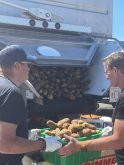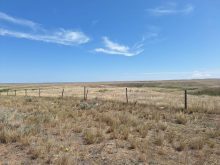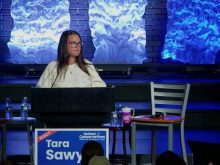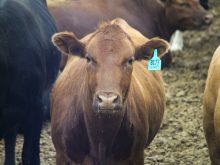The National Farmers Union’s (NFU) new president, Saskatchewan farmer Terry Boehm, says addressing the downturn in the hog and cattle sectors and preventing market disruption due to contamination from genetically modified (GM) crops top his to-do list.
The 51-year-old farmer from near Allan, southeast of Saskatoon, was elected at the NFU’s 40th annual meeting in Ottawa Nov. 27. Boehm, the NFU’s vice-president for the previous six years, defeated the president of the NFU in New Brunswick, Jean-Edes Chiasson, 79-21 in a secret ballot.
Read Also

Farming Smarter receives financial boost from Alberta government for potato research
Farming Smarter near Lethbridge got a boost to its research equipment, thanks to the Alberta government’s increase in funding for research associations.
Chiasson, who nominated himself, later ran for vicepresident, but was defeated by Dave Lewington of Lavinge, Ont. Colleen Ross of Iroquois, Ont., who stepped down as the NFU’s women’s president, also ran for vice-president.
Don Mills of Granton, Ont. was acclaimed second vicepresident, a new position created by a constitutional amendment. Joan Brady of Dashwood, Ont., and Kalissa Regier of Laird, Sask., were acclaimed women’s and youth presidents.
The NFU says cattle prices are depressed due to a lack of packer competition. Competition is further reduced because plants own some of their own cattle, referred to as “captive supply,” Boehm said in an interview.
Canada’s hog industry is also in turmoil because of low prices, but farmers in the Maritimes are suffering even more due to a lack of killing plants, he said.
“It’s just reflective of the many things that we predicted a long time ago in terms of consolidation and the reliance on export markets,” he said.
MARKET SENSITIVITY
The recent disruption in Canadian flax exports to Europe due to contamination from a deregistered GM flax demonstrates how sensitive markets are, Boehm said. Now there are concerns flax dockage in canola could disrupt canola exports to Japan, he said. Japan has approved GM canola, but not GM flax.
“We had all this discussion about adventitious presence and tolerances a few years ago but it turns out that when you let this genie out of the bottle it shows up in all kinds of unintended places and causes all sorts of ill consequences,” he said.
Recent changes to Canada’s crop registration system will only make things worse, according to Boehm. Crop kinds fall into one of three “tiers,” one of which requires no end-use quality or agronomic assessment. The new system also allows crops to change tiers.
“As crop kinds move down to less onerous tiers it would allow the commercialization of GM crops much more quickly,” he said. “There isn’t any corresponding regard to the consequences of that in terms of markets and that becomes pretty worrisome.”
Boehm said he wrestled with letting his name stand for election. Managing his farm, where he grows wheat, durum, barley, flax, canola, yellow mustard, peas and lentils, is a big job, he said. He does all his own mechanical repairs and electrical work. He and his partner have a seven-year-old daughter and his partner, a social anthropologist, is based at an institute in France.
“I certainly want to spend time with them,” he said. “My parents help out quite a lot. My father is still very active and my mother at harvest is operating a combine and helping where she can at seeding time.”
“NON-PARTISAN”
Boehm replaces Stewart Wells, a Swift Current, Sask., farmer who stepped down after serving as NFU president since 2001. Under Wells’ watch the NFU’s membership grew to more than 6,600, partly because of checkoff funding for general farm organizations in Ontario, New Brunswick and Prince Edward Island. But Boehm said the NFU has gained strength because it’s dedicated to preserving the viability of family farms.
“The first thing I want to say is we are non-partisan and we have members from every political stripe and farms of every style and size,” Boehm said. “One of the reasons for that is when people look at our policies and analysis they see things in it that make sense to them. I don’t think of it as left or right or in between. It’s not about those labels, it’s about how we advance the interests of farmers and ultimately all kinds of people.” [email protected]














